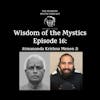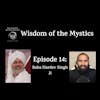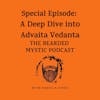Wisdom of the Mystics: Gorakh Nath ji
In this episode of The Bearded Mystic Podcast, host Rahul N Singh continues the Wisdom of the Mystics series, this time delving into the teachings of Gorakh Nath Ji, a well-known poet. The episode explores Gorakh Nath Ji's poetic spiritual teachings, with a focus on how they interpret the world and inspire various paths to reach the ultimate destination. Throughout the podcast, the host emphasizes practicing spirituality with joy, happiness, and playfulness, and discusses important ideas like restraining the five senses, dying to ego and achieving awareness of the formless. The podcast further talks about the importance of the Guru's teachings, discussing spirituality as a journey of continuous exploration, and how one's association with their spiritual community aids their journey.
I hope you enjoyed listening to the Wisdom of the Mystics series. If you want to listen to more episodes about Non-Duality and a deep dive into the Bhagavad Gita, please follow/subscribe to this Podcast.
Thoughts on the Upanishads, Conversations with the Bearded Mystic, Guided Meditations, and much more only on Patreon, Buzzsprout Subscriptions, Apple Podcast Subscriptions and Supercast.
Patreon: Support The Bearded Mystic Podcast and get ad-free, bonus episodes along with many more benefits:
https://www.patreon.com/thebeardedmysticpodcast
Join The Bearded Mystic Podcast Discussion Group on Whatsapp: https://chat.whatsapp.com/GcCnyrjQwLuEPHBaVA6q9L
Be notified of my weekly virtual meditation session followed by a Q&A Discussion via zoom (Notifications only):
https://chat.whatsapp.com/DcdnuDMeRnW53E0seVp28b
If you would like a one-on-one meeting with me via Zoom, book here:
https://calendly.com/thebeardedmysticpodcast/1on1meetings
Please rate and write a review for this Podcast: https://www.thebeardedmysticpodcast.com/reviews/new/
You can follow me and contact me on social media:
Website: https://www.thebeardedmysticpodcast.com
TikTok: https://vm.tiktok.com/ZMdk3HPJh/
Instagram: https://www.instagram.com/thebeardedmysticpodcast/
Youtube: https://www.youtube.com/c/TheBeardedMysticPodcast/
Twitter: https://twitter.com/bearded_mystic
Facebook: https://www.facebook.com/The-Bearded-Mystic-Podcast
Rahul N Singh:
Hello and welcome to another episode of The Bearded Mystic Podcast and I'm your host Rahul N Singh. Thank you for joining today and taking out the time to either watch or listen to this podcast episode. Today we will be continuing on with the series Wisdom of the Mystics. As you know, last month we looked at the teachings of Mirabai Ji, and today we will be looking at the teachings of Gorakh Nath Ji, who is a popular poet as well. We have looked at quite a few of the bhakti poets, although Gorakh Nath Ji is more of a sanyasi than a householder, but there's something to learn even from them and to see how they interpret the world and how we need to possibly be inspired by some elements of what they say. Ultimately, everyone's talking about that ultimate destination, and I've mentioned this in many other podcasts, that there are many ways in order to approach the peak of the mountain. Some are longer routes, some are more arduous, some are easier, some require a little bit more help, some require more attention, more focus, some just require good company. So it really depends and the main thing is that you just got to reach the peak. So this is the whole point of the Wisdom of the Mystics series, it's not about You know, proving that one religion is better than others, or one religion has the most amount of mystics. This is just based on my regional understanding, hence I gravitate towards more of the Indian mystics. But, there's a lot to learn from everybody. This is the 24th episode, so that means that, you know, we've been doing this series for two years and it's been one of the, my favorite series because it allows me to learn from different perspectives and., it's really great that we get to celebrate this two year anniversary of Wisdom of the Mystics and we'll start off with Gorakh Ji. His first poem, he says, No Vedas, no holy book, no speeches, no sermons, they will all mask the truth. The word shines high in the firmament, there the Vijnani sees the unseen. He says no vedas, no holy book, making it very clear that, yes, it's important to have the vedas, it's important to have a holy book, but what's more important? What's more important? Is it the actual truth or the book which holds the truth? Remember the book holds the truth. It is not the truth. The truth is always an experience, it's something practical, something that you can actually taste. A book tells you about the taste, now if I tell you that sugar is sweet, that's just something that is stated. But if you taste sugar, and you then understand that, actually, you know what? Sugar is sweet. I understand what sweetness is now. Now, sweetness no longer becomes something you've read about, but something you experience. So, likewise, no Vedas, no holy book, no speeches, no sermons. They all mask the truth. So the Vedas, even though they speak of the truth, but you can easily get lost in them. For example, you can start just looking at the mantras and you can maybe looking at the incantations, the spells, the, the other aspects of it. You can see supporting the old Vedic gods, where today those Vedic gods aren't necessarily worshipped. That doesn't mean that tomorrow they may not be worshipped. They could well be, but they're no longer worshipped. Some of the practices, the karmakand portion, half of it's not even practiced anymore, and it's not relatable. So, we've got to understand that they mask the truth. What's the truth in the Vedas is obviously the Upanishads, because that's the philosophical portions, but there's other aspects which may also be the truth, but the thing is, we can easily get lost. There's no holy book, and in general, any holy book, whether it's the Puranas, the Gita, the Quran, the Bible, any, any of them, you know, any holy book, they can also mask the truth because sometimes we become defenders of the book instead of Defenders of the truth. Now, truth and the book will always be different. The book is just that, those pages that contain the ideas of truth. But truth is something that takes you beyond the words of the page. And that's why Gorakh Nath ji is talking in that manner. And he says no speeches. You can listen to a thousand podcasts. I can record a thousand podcasts. Will it get me closer to the truth. No, only if I talk of the truth is there some element, but I know I'm already in a losing battle. Every author knows they're in a losing battle when they're talking about the truth. They know that the truth is something that is only understood when it's experienced. So it does mask the truth. sermons, as you know, although we don't listen to many sermons, I like the, you know, one hour, two hour lectures and stuff like that, I'm quite boring like that, but it's It's all interesting and for me, yeah, do they talk of the truth all the time? No, you know, you have to kind of go around the subject, make it appealing. So it really depends on the person and, and whether they can talk directly to the truth. But there are some times when, you know, we've done this, when we record in the podcast where something is felt, something unique is experienced in the moment and an element of the truth is there, that we cannot deny. And this happens. Then it's not about the words that are spoken or the words that are heard, it's more about what is it that's here right now that's undeniable, that's so direct that it cannot be denied. So that's another thing we need to understand is, yes, they may all mask the truth, but the truth can never be masked. Just understand this, the truth is always shining bright, it's self illumination, it's self luminous, it doesn't require any external light to shine on it, the truth is always complete, but what we can do is put veils in front of that truth, in front of that light, and therefore people do not see what the truth is. Then he ends with, the word shines high in the firmament, there the vijnani sees the unseen. So high in firmament means in bliss. So the word shines high in bliss. When we're in bliss, when we're in ananda, when we are happy, when we're truly happy, as I mentioned my guru always says bliss is true happiness that is beyond the senses. So the word meaning the gyan, the actual truth, that shines high in bliss. So when you're in bliss, You experience it when you're in dukkha, when you're in, uh, the play of dukkha and sukkha comfort and pain and discomfort, then you can't be in truth, our mind doesn't get there, our mind becomes more heavy in those problems and this is what happens when we have problems in life and we allow them to grow and we allow them to take over our mind, we notice that we become less spiritual. Nobody ever becomes more spiritual, they can become more religious, but not spiritual, if they are in pain. If you're in happiness, and you then think of the truth, it's much easier. All we have to do is get ourselves that place of bliss, how do we do that? Understand who we are, we are this atma, we are not the body, we are not the mind Then he says, there the Vigyani sees the unseen So Vigyani here means, the one who lives in the knowledge, who is in awareness. So there the Vigyani sees the unseen. What's the unseen? This Brahman, this Nirgun Brahman, this formless awareness. That which we cannot deny and again, just imagine you're in, or not even imagine, bring yourself to the experience right now where you're in Ananda, when you're truly happy And then, you can then see the unseen. You can then try to put Nirguna Brahman in front of you, put the formless awareness in front of you, be aware of the formless awareness, be aware of Nirguna Brahman, and there, you will hit the spot where you then see the unseen. It's literally as easy as that. Now, I've explained, if you watch it on video, you see how I've gone through that process, and if you've heard me, you've heard me use the words, but this is done in silence, without words, you know, without me explaining it, and that's how we do it. Let's go to the second one, this is a very nice one, we may enjoy this. He says, laugh, play, and live joyfully. Have nothing to do with lust or anger. Laugh, play, sing your song, and keep your mind steady. I like Gorakh Nath Ji. He has a very, cool way and very calm way of presenting spirituality. Very playful. And spirituality is meant to be playful. Here he says laugh, play and live joyfully. This is very important. How many people we see who are spiritual but they're so somber, so serious, there isn't much life in them. And you have some who, they are full of laughter, they're playful, they're telling jokes, they're living joyfully, they're being happy in the moment. They don't need any other special moment to be happy. They don't need some spiritual insight to be happy. They're just happy being themselves and that is what it's all about. Laugh. It's very important to laugh. It's very important to take some time out and just watch a good comedy or just laugh at a joke. Don't be so serious. And play. You know, laughter can be spiritual. Play. Be joyful with life. Play with life. Don't take it so seriously. Don't take your life so seriously that you miss the joy that can be lived right now while you anticipate a joyful future. It's very important that we do that, so live joyfully, as it says, play and live joyfully. For example. I think kids are a great reminder of how to be in the present moment and just enjoy playing around. Same with like animals, like dogs especially. They tell you to be in the moment. Play. They don't know about how to be serious with life. They just want to enjoy. And I think that's what we need to learn to do is keep that inner child awake. Don't let that sleep. Laugh, play and live joyfully. This is spiritual. Absolutely spiritual. If you're spiritual This is what you're experiencing And then it says have nothing to do with lust and anger So lust in the sense of not just lusting after other people. But even other desires and items And things that other people have Now if you do not act upon those things and you allow that lust to grow It brings in anger What Gorakh Nath Ji really is talking about here is that have nothing to do with those things. If they appear in your life put them to the side and just laugh and live joyfully. We only have lust and anger if we feel that something is missing in our life. Is there anything missing in our life? Are we really missing anything? What truly means that you're missing in life, is it because you didn't get the Lamborghini, or you didn't get the five bedroom house, or you didn't get the holiday you wanted, the vacation you wanted, is that what's going to make you progress spiritually? No. Those things don't help us spiritually. When we do not have those things, then we have anger. We also feel jealousy for the people have it and we don't. So that's another reason why he says have nothing to do. If these things arise, just let go. Say, look, I love the house that I'm in now. It's keeping me cool, it's keeping me warm, it's protecting me from the weather outside, I'm able to do my tasks in the house, I have a car, I'm able to go from A to B, little things like that, we can be content and happy. And that's spirituality. And then he continues to say, laugh, play, sing your song, you know, sing your song, be happy, you don't just sing in the shower, sing everywhere, and, or just remember the Lord's name, and that's why he says, and keep your mind steady. As long as you have your mind steady, you can laugh, play, and live joyfully. There will be no problem. When you keep your mind still, steady upon this truth, you forever are in joy. You are forever in happiness and bliss. Let's go to the third quote. Some of us may have heard this before. It's a very popular poem. Laugh, play and keep meditating. Day and night declare the divine wisdom. Laughing and praying don't divert your mind. Motionless, always in the company of Nath. So first of all, laugh, play and keep meditating. We know about laughing, we know about play. Now, keep meditating he says, but I would add to that. Make sure laughter and play is part of your meditation. Don't make it so serious, like I said. Meditate joyfully, meditate playfully, meditate with laughter. You know, if you have a bad meditation, laugh about it. Don't take it so seriously. This is something we can do. And then it says, day and night, declare the divine wisdom. If you have the divine wisdom, you're going to continuously meditate anyway. Once you know this divine wisdom that there is only Brahman, there is only this ultimate reality, there is nothing else Then you will automatically meditate, what else is there to meditate upon other than your own self Even to say to meditate on empty mind or emptiness, that's still an object So he says day and night declare the divine wisdom. Day and night, just keep on remembering the Lord's name, that is the divine wisdom. Be aware of awareness, be aware of formless awareness, that is divine wisdom, that is that declaration. And if you have that declaration, if you have that in your life, you're going to be laughing, you're going to be playing, and you're going to keep on meditating, and you'll be living joyfully. This is what life is all about. Don't take it so seriously. That's what I would say. He says, laugh, play and keep meditating. Day and night, declare the divine wisdom. That's what we need to do. That's what we need to bring ourselves to go closer towards. It's an aim to have. If a lot of people took spirituality simply for what it is, they'll have a lot more joy. They'd be much happier, because then it's not so goal oriented. Don't make spirituality goal oriented, make it a terrain that you have to discover. Make it a mountain that you have to discover. And that every side of the mountain has its own beauty. And you just have to discover it. Then you have laughing and playing, don't divert your mind, motionless, always in the company of Nath. So company of Nath is the company of the Sampradaya that he was from, the Nath Sampradaya And most importantly, it's talking about keeping the company of the saints, keeping the company of fellow seekers who can help us in our spiritual journey. Uh, being part of the Bearded Mystic community. Whatsapp group is one way you can do this as well, where we talk about spirituality and we help each other, we guide each other. And here he says, laughing and playing don't divert your mind, motionless, keep your mind still, keep yourself still, and when you're in the awareness of formless awareness, do it joyfully, do it playfully, do it with laughter, with happiness, and this is what really life is about, so when you're in the company of the people that you love, that you seek spiritual wisdom from, spend time with them, and always be in that stillness, and if your mind ever tries to divert, remember, bring it back. Bring it back to that divine wisdom. Hence it says in the beginning, day and night, declare the divine wisdom. This has to be the way we see our lives, that it's all about being in the divine wisdom. It's all about remembering the divine name. It's all about being aware of formless awareness. I cannot emphasize this enough, and again do it with laughter, do it playfully, do it joyfully, that's the way we need to do. Now the fourth poem, Some debate, some argue. A yogi shouldn't argue. Just as the 68 rivers flow into the ocean, the yogi burns with the guru's word. So this is a very interesting poem. So he says some debate, some argue, a yogi shouldn't argue. Why shouldn't a yogi argue? It's something to think about. Why would a yogi not argue? Isn't a yogi a practitioner of the truth? Isn't a yogi someone that is always focused on the truth? Isn't a yogi someone who's meant to only talk about the truth? This is something to think about. He says some debate, some argue. So he's not saying not to debate. He's saying debate is okay. And he says some argue. There's a fine line between debating and arguing. Debating is when you're exploring the idea. Argument then becomes personal. You have a personal vendetta to make sure that person becomes wrong. Instead of the idea being the victor. Being the victorious element of it. He's saying here a yogi shouldn't argue. A yogi should never go personal. It should always be about debate of ideas and that's it. And if you notice that's something that I've really tried to do when I used to be on TikTok and, I don't think I've ever had so much of a, a YouTube, kind of debate. But, although I have asked some Hare Krishnas, if they would be willing to discuss their ideology with me, that hasn't moved forward. But, yeah, a yogi shouldn't argue. We shouldn't go personal and attack the person. But we should always look at the idea. And debate the idea. So, debate whether Advaita is correct, debate whether non duality is correct, debate whether Vishistha Advaita is correct. Debate all we must, but we should never go down to the level of criticizing the person. It becomes ugly and you see people do this and those people tend to, we end up finding them annoying eventually because how much How much of cussing another person can you hear? It's gonna, it's gonna become boring at some point. Debating ideas is always interesting because you find different arguments or points that people make and you're like, I didn't even think of this or wow, that's a unique perspective. So that's something also that we can find. Then he says, just as the 68 rivers flow into the ocean, the yogi burns with the guru's word. So this is very beautiful. We know that all rivers flow into the ocean, and that's normally understood. You have a small river, at the end of the day, then it becomes a vast. So he says here, the yogi burns with the Guru's word. Same way, when the yogi hears of the Guru's word, which is Brahm Gyan, which is this absolute truth. Once you listen to this, the yogi then burns. What burns? The ego burns. The small ego burns and enters into that vast awareness. And when that vast awareness is experienced, you come to a place of stillness. You remember the Guru's word, which is this Brahm Gyan. You settle yourself in that Brahm Gyan continuously, allowing every element, every atom of your ego to be burnt And slowly, slowly, slowly, you then just merge yourself into this vastness Not that you merge, you realise how vast you truly were and how limited you confined yourself. Now you find yourself limitless, beyond reach, beyond boundary. That's where you are. So the yogi burns with the Guru's word and that's truly what happens. The, this Brahm Gyan, it really inspires us to go deeper. It inspires us to go deeper into our faith, deeper into the experience of what that Gyan is telling us about, which is Brahman, this ultimate truth. Then we don't simply just say, Aham Brahmasmi as some Statement, it's an experience that is experiencing and there's no persona that is attached to that and that's what a yogi does. Then the fifth poem. He speaks the unspoken, holds the mind in emptiness, restrains the five senses, he sacrifices his body in the divine fire Mahadev bows to his feet. This is very interesting. So, who is this that we're talking about? One, we can refer to as the guru, as our teacher, as our spiritual master, but it can also be awareness itself, Brahman itself. He speaks the unspoken. Yeah, this one, this truth speaks to unspoken. What is this speaks to unspoken? What is that which is unspoken? This Brahm Gyan. So the Guru tells us about this Brahm Gyan and actually it is the Guru in this perspective and we will go through this, my aim is to also do a commentary on the Guru Gita at some point. So he speaks the unspoken. The Guru always speaks about the unspoken. What's the unspoken? Brahman. Brahman cannot be spoken of. No words, if you speak, you can only speak about it. You cannot speak it. You can only be it. You cannot be about it. You have to be it, but you, it can only be spoken about. Even then words do not touch what it is. So because the words do not touch what it is, no language can touch what it is. Even Aum is not enough to get close to it. It's, Aum is just something that's close to it. Not even completely it. So he speaks the unspoken. It's a transmission that happens. An invitation is given for you to enter into this. Unspoken truth, and that's what that is. Then he says, holds the mind in emptiness. This is Brahm Gyana. Although emptiness may not be the right word, but you could say in formlessness, holds the mind, in formlessness, in emptiness, in shunyata, what this means is that there is nothing, no object here. So the mind cannot capture anything because now the mind is in objectless non content consciousness. That's where the mind is. So we have to hold the mind. So the guru gives the gyan, then we are shown what this formless is within us and without us. And then we have to hold the mind in that state, in that formless state, and we have to stay there. We restrain the five senses. The five senses will want to process information, trust me. At that point The nose will smell like a barbecue happening or some nice, sweet dishes being made. Or, you may hear something outside and you're like, oh, what's that? Or you may want to open your eyes and see what's going on around you. Or if you have your eyes open already, your eyes are looking for something to be attracted towards. Your mouth is watering because you just smelled something amazing. So now you want to taste something. Yeah, so you're chasing that. So he says here, restrain the five senses, make sure the five senses do not go out in action. Yeah. So bring them back. Whenever they try to let go of your hold, bring them back to the emptiness because that's what they are. So that's what it means. Then he says he sacrifices his body in the divine fire. The divine fire means, it's not an actual fire, it's the fire of wisdom. So this divine fire of wisdom is what burns the identification of the body and mind to the persona. So that no longer happens. What happens then, now, is that this body and mind just functions and Brahman That's all, and you know the persona still remains as long as the body and mind is there. You do not identify with the persona, you identify with, you fully identify with Brahman, but you understand that in the relative reality. The persona has some importance, so you utilize it in that sense, but it's something to utilize, not something that you are. And then he says, Mahadev bows to his feet. If you read the Guru Gita, which we'll end up doing at some point, The Guru Gita specifically tells you, and it's Mahadev having a conversation with Parvati Ji, Shivji explains the importance of a Guru and she asks him, who do you worship? And he says, I worship the param Guru. What's the param Guru? The Guru that shows you the ultimate truth without any condition, without any prerequisite. The Guru doesn't give you mantras to do, or sacrifices to do, or rituals to do. The Guru just tells you the truth, unfiltered, just straight up, and is honest about it. That's what the Guru does. That's why Mahadev bows to his feet. That's why I link this to the Guru, because of that. If you've read the Guru Gita, it's really good. And I advise that everyone should read the Guru Gita, it's a very good text. It's full of depth and is worth talking about. We'll go to the sixth poem. The sky does not hide it. Fire does not burn it. Lady, the wind does not blow it away. The earth does not crush it. Water does not drown it. But who will believe what I am saying? Um, again, look, you have to laugh, you have to be playful. And he plays upon this very well. And if you're a lady, you can say man, it can be, or gentlemen, it doesn't have to be just a lady, but yes, so here he says, the sky does not hide it. What doesn't it hide? The formless awareness, nirguna brahman, the fire does not burn it. Again, we've heard this in the Bhagavad Gita, so we know about this, it's well known, but it's just his way of delivering it, it's so interesting. So we know the sky cannot hide it. We see Brahman everywhere. It's Satchitananda. It's in all existence. Fire does not burn it. It cannot be destroyed because it's changeless. It's not made of any substance. Lady, the wind does not blow it away. How can it be blown away? When it's everywhere, it's pervading everywhere. It can only blow away if it's from one, if it can go from one place to another place. But we know that's not the case here with Brahman. We know Brahman is always here. It's all pervading, permeating in everything. The earth does not crush it. How can it crush something that is, again, pervading everywhere, which has no form, which has no image, which is not made of any element, it has no name. How can it be crushed? Yeah? It's not made of any solid, liquid or gas. It's beyond it. Water does not drown it. It cannot be dampened in any way. It cannot be drowned. Yeah? If you, you can't put Brahman in water. Simple as that. Water is a reflection of Brahman. Brahman is He's immersed in everything, even in water. So he uses the elements to kind of signify how this Brahman is beyond it all. When he says the sky, I think he's meaning space as well, so that's something we can understand. But the last line is iconic. But who will believe what I'm saying? See, you cannot believe this. You have to know it, and then be it. Once you know it, that's it. It's done. Believing is automatic, and being is a practice. But who will believe what I'm saying? Only those who know this truth will believe. Nobody else believes. Nobody else is willing to take that time to understand. So, Gorakh Nath Ji is absolutely right. He will believe what he is saying. Only those who experience it. The rest will be like, he's a madman. I don't want to know him. And then, the seventh poem, which is the final one of today's episode. Die, yogi, truly die, dying is sweet. Die the death, Gorakh, died, beholding. First of all, die, yogi, truly die. So when he's talking about this, die Yogi truly die, what's truly dying? What dies is our identification to body and mind, and we start understanding that we are nothing but Brahman. Once we understand we are nothing but Brahman, then we can die, that true death. That's the true death. When we have got rid of the ego, when we die to the identification of the ego, that is truly, that's why he says dying is sweet. Don't fear this death. The body and mind has gone through countless deaths anyway. Don't worry. If you have to go through another one, that's fine. It's sweet, you're getting closer to the truth, closer to the destination hopefully. If you've done good karma. If you've done, not so good karma, then, maybe dying is less sweet, but it's still sweet. Dying is sweet, but in this aspect, what he's talking about, in terms of the spiritual death, then yes, the dying is absolutely sweet. Because it's not the body and mind that's dying, it doesn't exist. You know, the only thing that's died here is the identification. Then he says, die, the death, Gaurukh died, beholding, observing what? What was he observing? What's the wonder that he was beholding? This Brahman, this truth, this ultimate reality, this formless awareness, this shiva, this nirakar, this nirgun. This is what he was observing, this is what he was beholding. That's why he says, die, the death, Gaurukh died. That's the death that he had. Not the body, not the mind. Everybody dies with the body and mind But how many die truly whilst alive and then live the remaining years of the body and mind in the awareness of Brahman? That's the true death. That's why these yogis, these seers of truth, these Swamis, these mystics The reason why they inspire us is because they've lived a life which is beyond our understanding. They've taken us to a place where there is eternal life, for the true meaning of eternal life. And that is only experienced when we experience it in this life, while we're in this body and mind, in this moment. When we meditate joyfully, when we meditate with laughter, when we meditate with happiness and bliss, when we When we live life joyfully, when we live in the moment and appreciate every aspect of the moment, that's the death that Gorakh died. And that's the death that we want. That very death which makes us more alive than ever. Because now we know, death can never fall upon us. In fact, death is something that works for us and with us. And that's the difference. Death is not against us. Even if If this body and mind were to die, even death will hesitate Because how can it approach a yogi? How can it approach such a person? And that's why that death is sweet When one dies like Gorakh died When we allow our ego to die When we allow our hunger to die, our greed to die, our jealousy to die When we allow all those things that take us away from the truth to die, when we allow the false to die, when we allow the changing to die and we rest in the changeless, we rest in the formless, we rest in Brahman, in this ultimate reality for the rest of our days. And that is the end of today's episode. Thank you very much for listening. If you liked what you heard and liked what you watched, please do share this podcast with your friends and family who may enjoy this content. Do follow me on social media to keep getting updates. Join the Bearded Mystic Podcast WhatsApp community group to continue the podcast discussion, details are in the show notes and video description below. If you would like to support the Bearded Mystic Podcast as we discussed earlier, do check out the podcast Patreon page. Your support means everything, and it helps this podcast keep running. Details are in the show notes and video description below. Please do rate this podcast five stars and do give a review either on your favorite podcast, streaming app or on our website. Details are in the show notes and video description below. Please do like and comment on this video and subscribe to this YouTube channel. Do follow or subscribe to this podcast on your favorite podcast streaming app. Thank you very much for listening to this episode. Let's end with the Shanti mantra and the Soham mantra. Soham Soham. I am That. I am That. Aum Shanti Shanti Shanti Aum Peace Peace Peace Namaste
New to The Bearded Mystic Podcast?
Here are some great episodes to start with. Or, check out episodes by topic.















